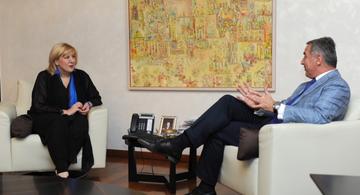
Speaking at the end of her two-day visit to Montenegro, OSCE Representative on Freedom of the Media Dunja Mijatović welcomed the new draft Code of Ethics for Montenegrin journalists
Link: OSCE
In her meeting on 6 July with Prime Minister Milo Đukanović, the Representative also stressed measures to strengthen media self-regulation and the fight to end impunity for attacks against journalists in the country.
“Journalists’ safety will always be my priority, it is essential that all attacks against journalists, including the murder of Duško Jovanović, are fully investigated and perpetrators and masterminds brought to justice”, Mijatović said following her meeting with Đukanović,
The Representative stressed that she welcomed the Prime Minister’s commitment to improve journalists’ safety and media freedom, and his support to her efforts in Montenegro.
On 6 July, a working group composed of representatives of the Media Council for Self-regulation, the daily newspapers Dan and Vijesti and the weekly newspaper Monitor, completed the revised draft of the Code of Ethics and opened it for public consultation. The Code has been developed with the assistance of experts from the Office of the OSCE Representative on Freedom of the Media and with support from the Council of Europe.
“Adoption of this Code also has a political dimension, as it is part of the process of confidence-building between the media actors,” Mijatović said. “I congratulate the members of the working group on this important achievement and their engagement to strengthen self-regulation going forward.”
The Code of Ethics is now open for public consultation until 1 September 2015. Comments can be sent to: Codexmontenegro@gmail.com or http://www.facebook.com/groups/codexmontenegro.
The new draft Code is available at www.osce.org/fom/170501.
Questa pubblicazione è stata prodotta nell'ambito del progetto European Centre for Press and Media Freedom, cofinanziato dalla Commissione europea. La responsabilità sui contenuti di questa pubblicazione è di Osservatorio Balcani e Caucaso e non riflette in alcun modo l'opinione dell'Unione Europea. Vai alla pagina del progetto
Log in or create a user account to comment.

 OSCE Representative welcomes new draft for journalists’ ethics code in Montenegro, addresses issues of journalists’ safety and impunity
OSCE Representative welcomes new draft for journalists’ ethics code in Montenegro, addresses issues of journalists’ safety and impunity 





 Tutti i contenuti disponibili sul sito di Osservatorio Balcani e Caucaso sono distribuiti con licenza
Tutti i contenuti disponibili sul sito di Osservatorio Balcani e Caucaso sono distribuiti con licenza  To Top
To Top